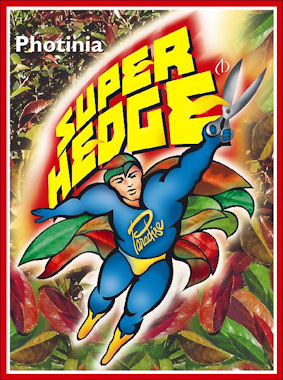The fastest Photinia on the Australian market! Self branching, bronzed new growth. Perfect for a quick screen or hedge.
The ultimate screening plant, this vigorous, hardy and fast growing form of Photinia makes a superb medium to tall hedge or screen up to 5m plus. Superhedge repeatedly produces flushes of rich bronze red foliage during the warmer months of the year. It's lateral branching habit, produces a dense bushy plant with minimal pruning required.
Paradise Photinia are very hardy and tolerate most soil types throughout most climatic zones of Australia, from the cold frost affected inland regions to the hot and humid coastal districts. But in all cases good drainage is essential.
Tall fast hedges
Public landscaping
Large feature shrub or tree
- Containers
- Exotic
- Foliage
- Hedging
- Screening
- Shrubs
Full sun or Semi shade.
Photinia will not tolerate waterlogged soils.
Heavy or compacted soils are best improved with organic matter prior to planting.
Good drainage is essential for all Photinia
Space plants 1m apart for a hedge or border.
Dig planting hole twice the width and depth of the pot to be planted. Backfill with topsoil ensuring that the rootball sits no lower than the surrounding soil level. Water deeply and apply mulch.
Once established Photinia are very tolerant of dry conditions however regular deep watering during the first 3 months after planting will help to establish a stronger and more vigorous plant.
Mulch helps to protect surface roots from extremes of temperature and retains moisture in the soil. Mulch should be applied to a depth of 10cm and kept at least 5cm - 10cm away from the base of the plant to ensure adequate airflow around the stem. Placing mulch right up to the stem can increase the likelihood of pest and disease problems occurring.
Pruning your Photinia once a year is all that is required to maintain a compact and neat plant. However if a hedge or more formal shape is desired they can be trimmed at any time of year as necessary.
Fertilise Spring and Summer with a high quality complete fertiliser.
 Look out for this label in all good garden centres.
Look out for this label in all good garden centres.